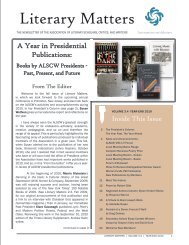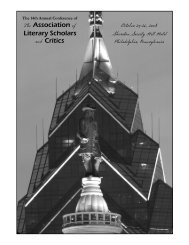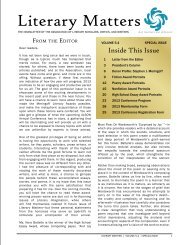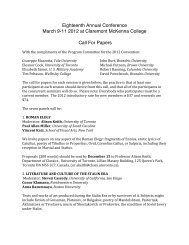Literary Matters 5.3 - Association of Literary Scholars, Critics, and ...
Literary Matters 5.3 - Association of Literary Scholars, Critics, and ...
Literary Matters 5.3 - Association of Literary Scholars, Critics, and ...
You also want an ePaper? Increase the reach of your titles
YUMPU automatically turns print PDFs into web optimized ePapers that Google loves.
Louisiana State UniversityLocal Meeting: November 9, 2012By Br<strong>and</strong>on ThomasOn November 9, 2012, under aclear sky in the cool late-autumnair, the <strong>Association</strong> <strong>of</strong> <strong>Literary</strong><strong>Scholars</strong>, <strong>Critics</strong>, <strong>and</strong> Writers heldan interdisciplinary symposiumentitled “Transatlantic Relations:History, Legacy & Perspectives”in Baton Rouge, Louisiana.Juxtaposing European <strong>and</strong>American scholarly thinking, thesymposium took place at twolocations on the LSU campus—the Howe Russell GeoscienceComplex was reserved for themorning, <strong>and</strong> for the afternoon,the historic Hill Memorial Library.Every year the Program in Comparative Literature hosts a regional meeting <strong>of</strong> the ALSCW, which affords graduatestudents the opportunity to present their work.This year we decided to combine the meeting with a symposium made possible by a grant from the German Embassy’s“Think Transatlantic” project, organized by faculty in the German department: Gundela Hachmann, Harald Leder,<strong>and</strong> John Pizer. We thereby provided a full-day conference featuring Lawrence Kritzman <strong>of</strong> Dartmouth College asthe ALSCW keynote speaker, who also served as moderator <strong>of</strong> the graduate student roundtable. Four scholars wereinvited to participate in the symposium, <strong>and</strong> three graduate students presented papers in addition to the ALSCWkeynote <strong>and</strong> round table. This gathering entailed a series <strong>of</strong> timely examinations <strong>of</strong> transatlantic culture <strong>and</strong> literaturefrom German, French, <strong>and</strong> American perspectives. The day ended with a reception <strong>and</strong> poetry reading.Pr<strong>of</strong>essor Günter Bisch<strong>of</strong> <strong>of</strong> the University <strong>of</strong> New Orleans opened the symposium with a discussion on geostrategicparameters <strong>of</strong> transatlantic relations in the post-World War II era. He examined the American involvement in therestructuring <strong>of</strong> Germany—from a macrocosmic historical perspective—both politically <strong>and</strong> geographically (with theelimination <strong>of</strong> Nazism <strong>and</strong> dismembering <strong>of</strong> the nation) through the implementation <strong>of</strong> NATO forces <strong>and</strong> policies,which pacified the Prussian spirit. Bisch<strong>of</strong> structured his presentation around the assertion that the goal was torebuild Germany in a manner that both punished the defeated nation for its inhumane actions during World War II<strong>and</strong>, at the same time, allowed it to re-establish itself rather quickly in Europe.Harald Leder, Director <strong>of</strong> Academic Programs Aboard at Louisiana State University, <strong>of</strong>fered a parallel treatment <strong>of</strong>German-American relations at the grassroots level in the second lecture <strong>of</strong> the day. Leder focused on the microcosmicaspects <strong>of</strong> rebuilding Germany, relating the American efforts to both indoctrinate <strong>and</strong> rehabilitate the German youththrough a series <strong>of</strong> programs, among which the German Youth Activities (GYA) figured prominently. This organization,created by Major Seltzer <strong>of</strong> the US Army, re-established library systems in Germany through donated books fromAmerica, <strong>and</strong> opened youth centers where children could play in a safe, heated environment <strong>and</strong> were fed when foodwas scarce.Leder humorously related how, in many cases, the US GIs were babysitters in some capacity, <strong>and</strong> how these centerseven provided day care, as was depicted in several editorial cartoons <strong>of</strong> the day. Moreover, American GIs encouragedthe first soapbox derbies in Nuremburg, <strong>and</strong> influenced German enthusiasm for basketball <strong>and</strong> American radio (inparticular the AFN radio transmissions). While touching on the subject <strong>of</strong> racism in transatlantic exchanges, Lederbriefly addressed the topic <strong>of</strong> interracial relations between black American soldiers <strong>and</strong> white German women, thechildren <strong>of</strong> whom were subjected to a considerable amount <strong>of</strong> discrimination in both American <strong>and</strong> German society,<strong>and</strong> were never fully accepted by either.In the later morning hours, LSU's Jesse Russell discussed the transatlantic nature <strong>of</strong> Ulysses’ <strong>and</strong> Dante’s sea journeys,while Amy Catania’s portrait <strong>of</strong> “Global Greece” eloquently examined questions <strong>of</strong> translation techniques <strong>and</strong> choicesin Chapman’s, Fitzgerald’s, Keats’s, <strong>and</strong> Vladimor’s treatments <strong>of</strong> Homer’s seminal work The Odyssey. In Catania’sstudy, she approached the question <strong>of</strong> readership along the lines <strong>of</strong> culture, time period, <strong>and</strong> accessibility basedon the translator’s intended audience. She relayed the inability <strong>of</strong> a translator to assimilate a text fully into anotherculture owing to language differences, <strong>and</strong> how transmigration <strong>of</strong> such a text establishes a somewhat stereotypical12 LITERARY MATTERS | VOLUME <strong>5.3</strong> | FaLL/WINTER 2012







